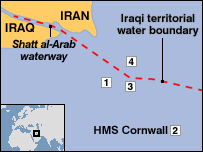Craig Murray:
The British Government has published a map showing the coordinates of the incident, well within an Iran/Iraq maritime border. The mainstream media and even the blogosphere has bought this hook, line and sinker.
But there are two colossal problems.
A) The Iran/Iraq maritime boundary shown on the British government map does not exist. It has been drawn up by the British Government. Only Iraq and Iran can agree their bilateral boundary, and they never have done this in the Gulf, only inside the Shatt because there it is the land border too. This published boundary is a fake with no legal force.
B) Accepting the British coordinates for the position of both HMS Cornwall and the incident, both were closer to Iranian land than Iraqi land. Go on, print out the map and measure it. Which underlines the point that the British produced border is not a reliable one.
Of course, the official British line is treated as almost gospel:
BBC:
Vice Admiral Charles Style said the sailors had been "ambushed" in the Gulf after searching a vessel and their detention was "unjustified and wrong".
Tony Blair said it was time to "ratchet up" pressure on Iran, with whom the UK has now suspended bilateral contacts.
The prime minister said: "These personnel were patrolling in Iraqi waters under a United Nations mandate. Their boarding and checking of the Indian merchant vessel was routine - there was no justification therefore for their detention."
UK VERSION OF EVENTS

1 Crew boards merchant ship 1.7NM inside Iraqi waters
2 HMS Cornwall was south-east of this, and inside Iraqi waters
3 Iran tells UK that merchant ship was at a different point, still within Iraqi waters
4 After UK points this out, Iran provides alternative position, now within Iranian waters
The only thing that has helped me keep my faith in the integrity of the BBC is the headline of the previous section--"UK version of events." Funny how just a few words can make all the difference in the world...
Arthur's take on it is here.
His anecdote about the missed opportunity from his youth has gotten me to thinking about the philosophical ramifications of investing in a socially responsible way or not--and how one may apply the financial benefits reaped from such investments.
Riddle me this, Batman:
Is it acceptable to invest and reap financial rewards from not so socially responsible investments (in defense industries or energy industries who aren't as environmentally responsible as they could be) if the resulting gains are applied towards endeavors that are more aligned with social responsibility (a more ambitious blog effort than this one, active investment/development of alternative energy industries, support/founding of humanitarian aid foundations)?
An interesting question to ponder. Although the age old saying about the road to Hell and the Good Intentions that it is paved with always should be kept in mind whenever one contemplates and/or actively pursues such a course of action.
As to which nonsocially responsible industries are the best bets, your guess is as good as mine... if I knew the answer to that, I wouldn't be writing here nearly as often--I'd be too busy dealing with my many (hopefully world redeeming, but you never know, money does funny things to people) endeavors and having my ulcers (from the worry about all that great sums of cash inevitably causes) treated... Batteries seem like a good bet, but who knows? Everyone seems to be exploring and finding new reserves of fossil fuels and staking their claims, so that might be a red herring for another fifty years.

No comments:
Post a Comment